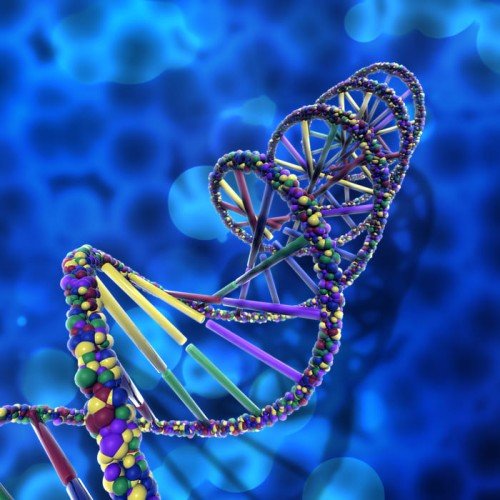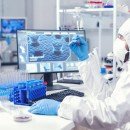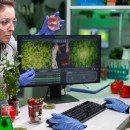
Synthetic biology — the art of designing and constructing new biological systems — is revolutionizing how humanity approaches health and disease.
Unlike traditional biotechnology, which modifies existing organisms, synthetic biology builds biological parts from scratch, creating life forms engineered for specific purposes: fighting infections, producing drugs, or regenerating damaged tissue.
This discipline combines biology, engineering, and data science to unlock possibilities once considered impossible. Over the past decade, it has transformed from a niche academic field into a multi-billion-dollar industry driving the future of medicine, agriculture, and sustainability.
From Natural Biology to Engineered Systems
Traditional biology focuses on understanding nature. Synthetic biology, in contrast, seeks to redesign it. Scientists use DNA as a programmable code — much like software — to create organisms with entirely new functions.
For instance, synthetic biologists can engineer bacteria to detect diseases in the human body, light up when cancerous cells are present, or even produce life-saving compounds such as insulin or antibiotics.
This approach is changing medicine at its core. By constructing new biological systems, researchers can create solutions that are faster, cheaper, and more sustainable than conventional pharmaceutical production.
The speed of development is extraordinary: a genetic design that once took years to produce can now be generated in weeks using automated DNA synthesis and machine learning.
Revolutionizing Drug Development
Drug discovery is one of the most time-consuming and costly areas of healthcare. Synthetic biology has begun to reshape this process completely.
Using programmable cells and biofactories, scientists can produce complex molecules that traditional chemistry cannot easily replicate. Synthetic organisms are now manufacturing vaccines, enzymes, and therapeutic proteins with remarkable precision.
The COVID-19 pandemic provided a glimpse of this future. Rapid vaccine development relied heavily on gene synthesis technologies — a direct application of synthetic biology principles. These same methods are now being used to develop personalized therapies for cancer, autoimmune diseases, and genetic disorders.
By merging computational biology with laboratory engineering, drug development is becoming a more predictable, data-driven process rather than one based on trial and error.
Precision Medicine: Tailored Treatments for Every Patient
One of the most promising applications of synthetic biology lies in precision medicine — the ability to design therapies tailored to an individual’s genetic profile.
Scientists can now program cells to deliver drugs only where needed, reducing side effects and maximizing effectiveness. For example, engineered immune cells known as CAR-T cells are being designed to hunt down and destroy cancer cells selectively, leaving healthy tissue unharmed.
Synthetic biology also enables “smart therapies” — living systems that sense changes in the body and respond automatically. Imagine a cell that detects inflammation and releases an anti-inflammatory compound in real time. Such innovations are no longer science fiction; they are entering clinical trials.
Biomanufacturing and Sustainable Medicine
Beyond therapy, synthetic biology is transforming how medicines are produced. Instead of relying on expensive chemical synthesis or animal-based production, scientists can now use microbes as mini-factories.
These engineered organisms can produce insulin, growth factors, and even vaccines more efficiently and sustainably. Biomanufacturing reduces costs, minimizes waste, and ensures stable production — crucial for making healthcare more accessible in low-resource settings.
The economic potential is enormous: according to McKinsey, synthetic biology could impact up to $4 trillion annually across multiple industries by 2040. Healthcare will be one of the greatest beneficiaries of this transformation.
Artificial Intelligence Accelerating Discovery
AI has become an indispensable tool in synthetic biology.
Machine learning models analyze vast datasets to predict how genes, proteins, and cells behave. This predictive power accelerates research, allowing scientists to design organisms and therapies that are more likely to succeed in clinical testing.
For example, AI can simulate how a modified bacterium might interact with human tissue before it is ever created in a lab. This reduces time, cost, and ethical concerns, while significantly increasing safety.
The convergence of synthetic biology and AI is pushing medicine into an age where biology can be engineered with the same precision as technology.
Global Collaboration and the Power of Communication
Synthetic biology thrives on global collaboration. Research teams across continents share genomic data, laboratory protocols, and digital blueprints for biological constructs.
This interconnected ecosystem mirrors how information travels in the digital world — through trusted, authoritative networks that strengthen credibility and accelerate innovation.
In fact, the concept is similar to how digital publishers buy backlinks to enhance online visibility and trust. In science, as in digital communication, reliable connections amplify reach and reputation. Synthetic biology’s breakthroughs depend on transparent, verifiable collaborations across international networks — the scientific equivalent of building authority through quality links.
Ethical Boundaries and Regulatory Challenges
With great power comes great responsibility. The ability to design life raises profound ethical questions.
Should humans have the authority to rewrite nature? Where should the line be drawn between therapy and enhancement?
Governments and international organizations are now developing frameworks to regulate synthetic biology safely. The challenge lies in encouraging innovation while preventing misuse — such as the creation of harmful organisms or untested genetic modifications.
Maintaining transparency, ethical review, and global cooperation is essential to ensure synthetic biology remains a force for good.
Similarly, in digital ecosystems, building credibility — whether through research partnerships or online networks — must be done ethically. Just as reputable companies don’t blindly buy backlinks from unverified sources, scientists must ensure that collaboration and experimentation follow strict standards of integrity.
The Future of Medicine: Designed by Biology
The ultimate promise of synthetic biology is not to replace nature, but to work alongside it. The technologies being developed today will soon allow medicine to be proactive, not reactive — preventing disease before it begins.
Future hospitals may rely on engineered cells that repair tissue, regenerate organs, or neutralize infections autonomously. Medicine will become a living, adaptive system — one that learns and evolves with the patient. This vision of healthcare — sustainable, personalized, and globally connected — reflects the true potential of synthetic biology to redefine what it means to be human.
Recent Posts

What Biotech Breakthroughs Are...

How Editing and Proofreading S...

AI Tools Transforming How Biot...

Soluzioni Biotecnologiche Sost...

L’intelligence Artificielle ...

Las Tecnologías de Edición G...
Share it.
Categories
Links
© Copyright 2022 Emotiv Life Sciences


